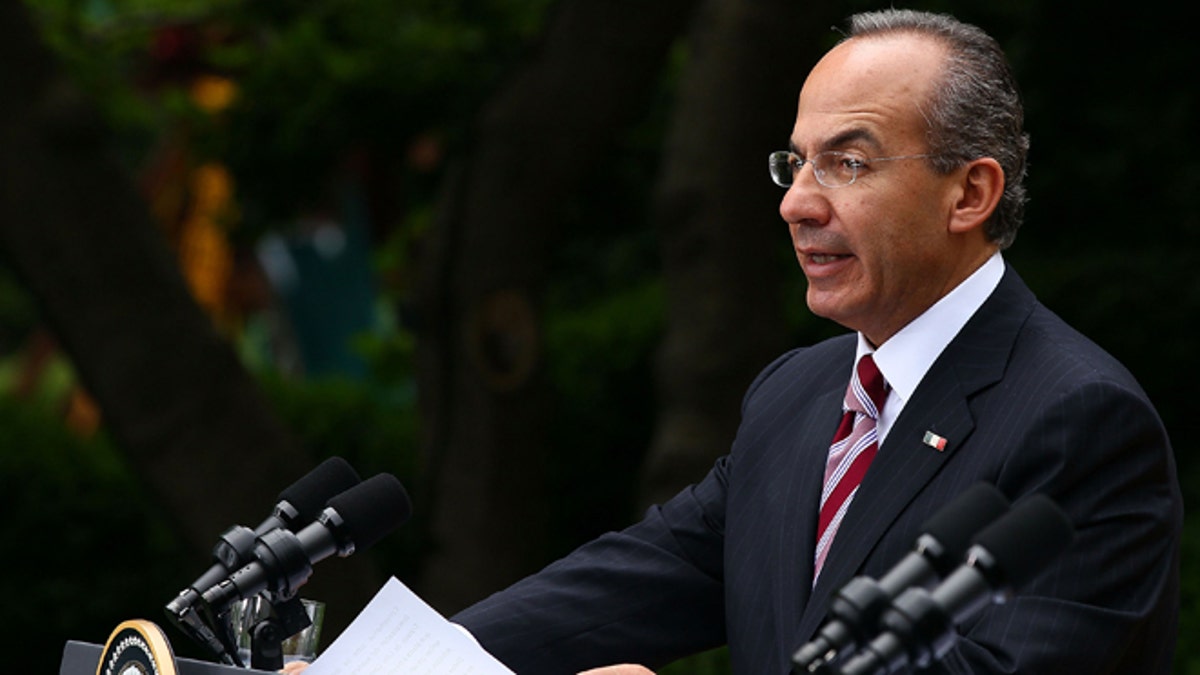
WASHINGTON - MAY 19: Mexican President Felipe Calderon answers a question during a joint press conference with U.S. President Barack Obama in the Rose Garden of the White House during an official visit May 19, 2010 in Washington, DC. Calderon and Obama are were expected to talk about immigration policy, the drug war that has left thousands dead since Calderon became president in 2006 and trade between the two nation during a meeting in the Oval Office. (Photo by Win McNamee/Getty Images) (2010 Getty Images)
The dean of Harvard’s Kennedy School of Government is defending the university’s appointment of former Mexican President Felipe Calderón to a one-year teaching fellowship.
In response to a letter addressed to Harvard by Mexican poet and activist Javier Sicilia and academic Sergio Aguayo, Dean David Ellwood said that the school has a history of welcoming world leaders of varying backgrounds to the Ivy League institution.
“The unique opportunity to engage in direct discussion with a former head of state is one that many of our students value greatly, even if they may disagree with some of that leader’s policy positions,” he wrote in a letter to Aguayo and Sicilia. “It is certainly not our intent to impact, nor do I believe that this fellowship affects, the ability of Mexico or Mexican citizens to address important national issues. I commend your deep commitment to your country and your efforts to move such issues forward.”
The Mexican academics oppose the appointment because of the number of deaths attributed to the drug war under Calderón's administration
Sicilia, who started the Caravan for Peace movement in Mexico after his son was killed by drug traffickers in 2011, has been a vocal advocate for reducing violence in the country and became a major critic of Calderón’s drug policy in the waning days of his administration.
During Calderón’s six years in office, an estimated 70,000 people died in violence related to the country’s ongoing drug war. An escalation in murders and other violent crimes arose soon after Calderón took office in 2006, when he declared an all-out military blitz on Mexico’s drug cartels.
In response to Ellwood’s letter, the two academics they promised to send the Kennedy School a number of ideas and proposals about the Calderón appointment.
“A pillar of democracy is the respectful exchange of ideas,” they wrote. “In the coming days we will send a number of considerations accompanied by some proposals.”
Some academics argue that appointments of former world leaders at U.S. universities are always divisive –such as Georgetown’s appointment of former Colombian President Alvaro Uribe– but Calderón’s hiring is even more controversial given the human rights crisis in Mexico.
“This one is even more so given the number of deaths in Mexico,” said Monica Rankin, an assistant professor of history at the University of Texas at Dallas.
Rankin added that these types of movements against former world leaders will become more common in the future given the advent of social media and the ease in which information can spread.
Along with activists in Mexico, the former Mexican ambassador to the U.S. also lodged a complaint to the Kennedy School.
Ambassador Héctor Cruz Vasconcelos, a former Harvard student himself, has said that if the school maintained their fellowship with Calderón he would be in the “painful situation” to return his degree. Cruz Vasconcelos received a bachelor’s degree in political from Harvard in 1968 and has since written for a number of publications published by the university.
"I believe that the presence of Calderón at Harvard contradicts the values of representative democracy, critical thinking and intellectual and personal honesty the University promotes," Vasconcelos wrote in the Mexican news site Sin Embargo. "I hope the Kennedy School reconsiders and is sensitive to the feelings of millions of Mexicans."
